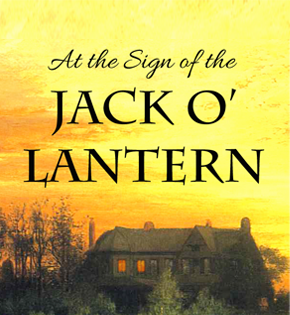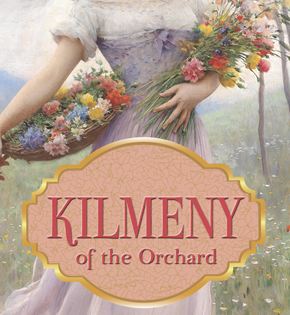The ballad is well known to the characters of the story and is referenced several times, notably after the hero of the story, Eric Marshall, first encounters the beautiful and mysterious Kilmeny in her hidden orchard and learns more about her from the townsfolk:
"So this girl is at the core of a tragedy," he reflected, as he went to his room. "And she is mute! The pity of it! Kilmeny! The name suits her. She is as lovely and innocent as the heroine of the old ballad. 'And oh, Kilmeny was fair to see.' But the next line is certainly not so appropriate, for her eyes were anything but 'still and steadfast'—after she had seen me, at all events."
He tried to put her out of his thoughts, but he could not. The memory of her beautiful face drew him with a power he could not resist. The next evening he went again to the orchard.
The ballad of "Kilmeny" revolves around a classic theme in Scottish folklore: faeries. In the ballad, a beautiful young village lass, Kilmeny, is abducted by faeries and taken to the faery kingdom, where she is kept for seven years. She finally returns to the mortal realm, but she has been changed by her experience.
Kilmeny, Kilmeny, where have you been?
Long hae we sought baith holt and den,
By linn, by ford, and greenwood tree!
Yet you are halesome and fair to see.
Where got you that joup o' the lily sheen?
That bonny snood o' the birk sae green,
And those roses, the fairest that ever was seen?
Kilmeny, Kilmeny, where have you been?
The poet James Hogg was born in 1770 in the idyllic vale of Ettrick in Scotland. His father was a poor tenant farmer, and James received no formal education, and spent the first thirty years of his life working as a farmhand and a shepherd. His mother fed his imagination with stories, ballads, and fairy tales passed down from generations before her, and young James whiled away his shepherding hours teaching himself to read and eagerly devouring any book he could get his hands on, though at times they were hard to come by. He taught himself to play the fiddle and began composing songs as a teenager for the village girls to sing. When he was twenty, he was hired to work for James Laidlaw, who admired James's desire to improve himself, and who made the books in his library available to him. Around this time James formed a literary society of shepherds with a few of his friends and discovered the works of Robert Burns.
Inspired by the beauty of the Scottish countryside where he spent nearly all of his time, James was fond of taking summer walking tours, and kept journals of his travels, which would later be published as part of his collection Scottish Pastorals. In 1801 he was recruited by Sir Walter Scott to collect Scottish ballads for an upcoming collection, and his literary career took off. He began publishing in Edinburgh Magazine and Scots Magazine and struck up friendships with many up and coming poets and writers of the day, including John Galt, Allan Cunningham, and William Wordsworth. He also struck up a few romantic relationships which resulted in at least two children born out of wedlock to different mothers, and he began to rack up more debt than he could handle, a problem that would plague him for most of his life. In 1810 James moved to Edinburgh to pursue writing full time. His first collection of poetry, The Forest Minstrel, was published that year, but it was his second collection, The Queen's Wake, that gained him acclaim and stardom.
From The Modern Scottish Minstrel, Volume II: The Songs of Scotland of the past half century:
Next to Robert Burns, the Ettrick Shepherd is unquestionably the most distinguished of Scottish bards, sprung from the ranks of the people: in the region of the imagination he stands supreme. A child of the forest, nursed amidst the wilds and tutored among the solitudes of nature, his strong and vigorous imagination had received impressions from the mountain, the cataract, the torrent, and the wilderness, and was filled with pictures and images of the mysterious, which those scenes were calculated to awaken.
Hogg was in his element, as he revelled amid the supernatural, and luxuriated in the realms of faery: the mysterious gloom of superstition was lit up into brilliancy by the potent wand of his enchantment, and before the splendour of his genius. His ballad of "Kilmeny," in the "Queen's Wake," is the emanation of a poetical mind evidently of the most gifted order; never did bard conceive a finer fairy tale, or painter portray a picture of purer, or more spiritual and exquisite sweetness.
Though there are no faeries on Prince Edward Island in 1910, there are still some similarities in the Kilmeny of the ballad and the Kilmeny of Montgomery's novel, and Montgomery also brings to life the mystical, magical qualities that the beauty of Mother Nature imbues, and the wonderment of being in the right place at the right time when Fate intervenes in the course of human events, as Eric Marshall discovers on the day he wanders into Kilmeny's secret orchard:
A man had given all other bliss
And all his worldly wealth for this—
To waste his whole heart in one kiss
Upon her perfect lips
You can read the full version of the poem here.
POSTED BY: Jenny Q
Kilmeny of the Orchard by Lucy Maud Montgomery
Professionally edited and formatted for today's e-readers!
Get the Legacy Vintage Collection Enhanced eBook Edition for 99₵!
Professionally edited and formatted for today's e-readers!
Get the Legacy Vintage Collection Enhanced eBook Edition for 99₵!

































